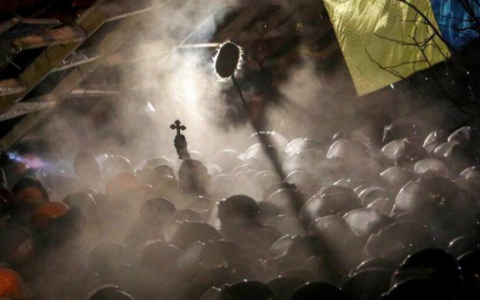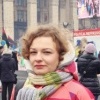EXCLUSIVE - UKRAINE: a religious country on its knees
by - 5th March 2014

RUSSIA began its latest act of violence in Crimea when Ukrainians already felt at their most vulnerable.
We had just been through the most terrible time we could remember in our life; the nation was in deep shock, the victory seemed too costly to be called a victory; we had not buried all our dead yet and had no time to mourn. The first thing I saw in social media then was: ‘Pray! Only a MIRACLE can save us now’, and that was I think what most people felt.
I witnessed an incredible mobilization of prayer. ‘We are praying, because we could not react in any other way to what was happening’, says Oksana Tysovska, well-known Ukrainian photographer and organiser of a so-called ‘prayer chain’.
People pray 24-hours a day, organizing on Facebook. Each prays for half an hour and passes the ‘guard’ to a fellow Christian.
‘We felt that no one could stop the crime any more, when peaceful people were dying. We could only pray to the One who is Almighty. We could not imagine how some terrible things could be prevented, they seemed irreversible, but the answers we are getting to our prayers cannot be explained logically,’ Oksana says.
Another explains what that means: ‘The prayer chain gave to Christians of all denominations the feeling of a common responsibility for our state. This is exactly what united all of us. We felt a unity we had never seen or experienced before,’ says evangelical pastor Oleksandr Omelchenko.
For Roman-Catholic priest Mykola Myshovsky it was a question of witness. ‘I teach people when I preach, so I feel I have to be among them. When they feel scared, uneasy, I have to be with them,’ he told me.
 Fr Myshovsky lives in Vinnitsa, but he was the high-profile priest in a soutane visible to the media during the three months-long Ukrainian Revolution, who stayed days or sometimes weeks at a time.‘How can I call people to be good, if I am not among them in the difficult times?’
Fr Myshovsky lives in Vinnitsa, but he was the high-profile priest in a soutane visible to the media during the three months-long Ukrainian Revolution, who stayed days or sometimes weeks at a time.‘How can I call people to be good, if I am not among them in the difficult times?’
‘From the very beginning I knew that I had to come to Maidan (Independence Square) as a priest. I always came in a soutane so that everyone could recognize me as a churchman.’
Protests that were known as ‘Euromaidan’ started on 21 November in the centre of Kiev.The then Ukrainian government suddenly suspended preparations for signing an Association agreement with the European Union. Many Ukrainians felt cheated, because for years Ukrainian authorities, including recently dismissed president Yanukovich's Party of Regions, declared that Ukraine would move towards EU.
For many Ukrainians joining the EU means visa-free access to Western Europe. Even a short trip requires proof of purpose, ability to pay, identity documents, and proof of permanent return.
Imagine all this for a weekend to Paris. Ukrainians just feel isolated. They sense the circle of corruption is getting tighter around their own necks. ‘They’ve lost all sense of shame’ you would often hear it said in the streets of Kiev asthe presidential cortege passed, forcing drivers to wait up to 40 minutes, often daily.
All EU citizens I know believe they suffer from corruption. But one only has to peep into ex-president Yanukovich’s residence (the numerous photos and videos are published everywhere in the internet), to see it’s all relative. Ukrainians hoped that European Union mechanisms could address the fight against corruption. Giving up the EU association agreement so suddenly was, it seems, just the last straw for many.
One thing that is crucial to understand here is that Ukrainians were not out on the streets prepared to die merely to join the European Union. What started as a protest for European integration quickly shifted gear. It happened on 30 November when riot police attacked peaceful demonstrators, many of them students. The very next day the numbers of protesters multiplied. People now came out not for the EU, but against state violence against its own people. To stand against violence, corruption and banditry, people stayed on the streets until the very end.
On 11 December, when the authorities tried to demolish peaceful protests at Maidan [the Square] for the second time, Fr Myshovsky stood bravely between the Berkut (meaning eagle – the name for the riot police) and the protesters. He was calling for peace, telling the state forces to back off. He says that as a priest he felt he had influence. He tried to talk to riot police standing in linebehnd their body shields, seeing the first signs of shame on the face of one, then moving to the next in turn. ‘When a policeman lowered his eyes, I knew [I had got through] and could move on,’ Myshovsky says.

Prayers and preaching took place every day from midnight till 8 in the morning. Priests changed places with each other. Denomination did not matter any longer. Many days later, when Berkut interior forces and paid hooligans Titushky started shooting protesters with guns, and especially on the tragic days of 18-20 February when dozens of Ukrainians were shot at the centre of Kiev, Fr Myshovsky rushed to pray with the injured, and very often to grant absolution [of sins] to protesters who lay dying.
With kidnappings, attacks and finally shootings, protesters, as they are often described, found themselves in the middle of a war they had not sought. And in difficult times many cried out to God.
There were two ‘prayer tents’ working at the heart of the protests throughout. Father Myshovsky recollects that more than anything, people were asking how to forgive. The mother of Maksym Shymko, who was shot in Kiev on 20 February, appeared in public asking Ukrainians again and again to forgive those who killed her son.
Ukraine is traditionally Orthodox and, in the western region, Greek-Catholic. Protestant denominations are relatively large in numbers, but tend to be treated with suspicion and prejudice. Information about Interim President Turchynov being a Baptist was an obstacle to his career in the past. Yet, he took charge of the country, and was elected as head of parliament just after the bloody events unfolded, and when many were in crisis, in mourning or in shock. On 3 March, when the country camethe closest so far to the edge of war in Crimea, he was the man who called all Christians of whatever denomination to pray and fast for the future of Ukraine.

Our reporter Nataliya Lyubchenkova in Independence Square, Kiev.
